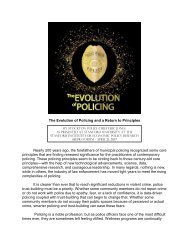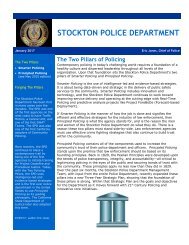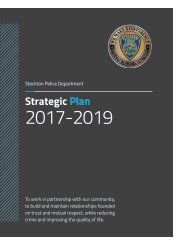National_Initiative_2017_Interim_Status_Report_Stockton
Create successful ePaper yourself
Turn your PDF publications into a flip-book with our unique Google optimized e-Paper software.
October <strong>2017</strong> • trustandjustice.org<br />
<strong>Stockton</strong><br />
<strong>2017</strong> INTERIM STATUS REPORT<br />
STOCKTON, CALIFORNIA IS ONE OF SIX PILOT SITES FOR THE NATIONAL INITIATIVE FOR BUILDING<br />
Community Trust and Justice (NI), a project designed to improve relationships and increase trust between<br />
communities and the criminal justice system, while also advancing public understanding of the issues contributing<br />
to those relationships. In collaboration with the U.S. Department of Justice, the <strong>National</strong> <strong>Initiative</strong> is coordinated by<br />
the <strong>National</strong> Network for Safe Communities at John Jay College of Criminal Justice, in partnership with the Justice<br />
Collaboratory at Yale Law School, the Center for Policing Equity at John Jay College and UCLA, and the Urban Institute.<br />
The <strong>National</strong> <strong>Initiative</strong>’s work involves trust-building interventions with police departments and<br />
communities based on three pillars:<br />
• Enhancing procedural justice: the way police interact with the public, and how those interactions shape the<br />
public’s views of the police, their willingness to obey the law, and their engagement in co-producing public<br />
safety in their neighborhoods.<br />
• Reducing the impact of implicit bias: the automatic associations individuals make between groups of people and<br />
stereotypes about those groups, and the influence it has in policing.<br />
• Fostering reconciliation: frank engagements between marginalized communities and law enforcement to<br />
address historical tensions, grievances, and misconceptions that contribute to mutual mistrust and<br />
misunderstanding and prevent police and communities from working together.<br />
At a Glance: Key highlights for <strong>Stockton</strong>, California<br />
Procedural Justice<br />
• All of SPD’s 400+ sworn officers have undergone training on the theory of procedural justice (“PJ1”) and<br />
operational techniques on how to apply it (“PJ2”).<br />
• SPD has trained more than 100 California agencies in PJ via train-the-trainers as the lead technical assistance<br />
provider for the statewide “Principled Policing” initiative and invited more than 40 community members into<br />
the training to observe and participate in facilitated conversations about police trust and legitimacy.<br />
Implicit Bias<br />
• Approx. 115 SPD officers have undergone the 8-hour training on implicit bias (PJ3).<br />
• SPD will roll out a community-facing implicit bias training (“PJ3—Community”) starting in early 2018.<br />
Reconciliation<br />
• During <strong>2017</strong>, Chief Jones led eight listening sessions with <strong>Stockton</strong> community members and local<br />
organizations, and has held more than 20 with various groups in the past year as part of his “Listening in a<br />
New Way” initiative.<br />
• Chief Jones regularly convenes with his Community Advisory Board (CAB) which is working with<br />
departmental leadership to reconsider 11 crucial department policies—from the department’s field training<br />
officer program to use of force and arrest procedures—to align with lessons learned from the reconciliation<br />
process.
October <strong>2017</strong> • trustandjustice.org<br />
<strong>Stockton</strong> was selected as a pilot site for its demonstrated willingness and capacity to engage in the <strong>National</strong><br />
<strong>Initiative</strong>’s research, intervention, and evaluation process, as well as its jurisdiction size and demographic<br />
composition. The <strong>National</strong> <strong>Initiative</strong> partners with public safety officials to develop, implement, and assess each<br />
intervention, which is tailored to the needs of the <strong>Stockton</strong> community. The successes and lessons learned in<br />
<strong>Stockton</strong> and each pilot site will set the city on a trajectory beyond the project’s formal end date and help to build<br />
a base of knowledge, policy, and practice to transform communities everywhere.<br />
This status report comes as <strong>Stockton</strong> moves into a fourth year of work with the <strong>National</strong> <strong>Initiative</strong>: moving forward,<br />
the <strong>Stockton</strong> Police Department (SPD) will take steps to institutionalize each component of the NI to ensure<br />
sustainability and longevity.<br />
Enhancing Procedural Justice<br />
<strong>Stockton</strong> is unique among the six pilot sites for having<br />
an existing procedural justice training program. To<br />
further <strong>Stockton</strong>’s commitment to procedurally just<br />
policing, the <strong>National</strong> <strong>Initiative</strong> worked with SPD to<br />
adapt this program to address <strong>Stockton</strong>’s unique<br />
history and police practices. Research demonstrates<br />
that procedural justice can increase public willingness<br />
to obey and cooperate with the police (“police<br />
legitimacy”) and ultimately lead to stronger policecommunity<br />
relationships and reduced crime.<br />
The PJ curriculum includes several modules that do<br />
the following:<br />
• Define the concept of legitimacy and highlight<br />
ways to increase police legitimacy;<br />
• Explain procedural justice and how it is necessary<br />
for advancing public safety goals;<br />
• Review the present-day relationship between the<br />
police and the community; and<br />
• Help SPD officers understand the role that history<br />
has played—from the Fugitive Slave Act of 1793<br />
through the Civil Rights Movement—in hindering<br />
legitimacy in some communities.<br />
It also features modules that thoroughly explore the<br />
real-life application of procedurally just policing<br />
principles, thus helping officers to recognize when,<br />
where, and how those principles should be applied.<br />
All of SPD’s 400+ sworn officers have undergone<br />
both 8-hour trainings on the theory and framework of<br />
procedural justice (“PJ1”) as well as operational<br />
techniques on how to apply this framework in<br />
practice (“PJ2”). SPD continues to deliver PJ training<br />
to new recruits. At last tally, SPD had trained more<br />
than 100 California agencies in PJ via train-thetrainers<br />
as the lead technical assistance provider for<br />
the statewide “Principled Policing” initiative and<br />
invited more than 40 community members into the<br />
training to observe and participate in facilitated<br />
conversations about police trust and legitimacy.<br />
The NI is working closely with SPD leadership to<br />
institutionalize the PJ curriculum and sustain it as a<br />
core part of SPD’s future policies. These efforts<br />
include:<br />
• Working with lead trainer Capt. Scott Meadors to<br />
consider new ways to deliver the material to SPD<br />
officers, members of the public, and other criminal<br />
justice actors, in order to facilitate meaningful<br />
cross-sector engagement and deepen their<br />
understandings of the importance of legitimacy to<br />
effective policing. Capt. Meadors has also worked<br />
with Dr. Elizabeth Hinton, professor of history<br />
and African-American studies at Harvard<br />
University, to enrich the history module of his<br />
procedural justice trainings.<br />
• Expanding the cohort of SPD officers qualified to<br />
train the department in procedural justice with an<br />
eye toward continuing this training in perpetuity.<br />
• Partnering with The Working Group’s Not In Our<br />
Town (NIOT), a national non-profit organization<br />
dedicated to reducing intolerance and preventing<br />
hate crimes, to coordinate a filming of PJ3 in<br />
<strong>Stockton</strong> PD. NIOT will include the training in<br />
their new documentary project “The Guardians:<br />
Stories of 21st Century Policing” funded by the<br />
COPS Office.<br />
• Complementing these efforts by collaborating<br />
with law enforcement partners to incorporate PJfocused<br />
metrics into performance evaluations and<br />
police department structures.<br />
• Exploring other ways to adapt the PJ trainings,<br />
including working with formerly group-involved<br />
individuals to modify the training for the officers
October <strong>2017</strong> • trustandjustice.org<br />
primarily concerned with group and gang<br />
violence.<br />
Reducing the Impact of Implicit Bias<br />
As part of the <strong>National</strong> <strong>Initiative</strong>’s work to address and<br />
reduce implicit bias, <strong>Stockton</strong> police trainers worked<br />
with NI staff to adapt the implicit bias training<br />
developed by the Center for Policing Equity. This<br />
training works to ensure that law enforcement is<br />
aware of implicit biases Americans hold and how they<br />
form, as well as the circumstances under which<br />
implicit biases are most likely to manifest in ways that<br />
jeopardize good judgment and safety. With this<br />
information in hand, officers and departments are far<br />
better equipped to work through police training,<br />
policy, and practice to identify and mitigate the<br />
scenarios in which implicit bias has significant<br />
negative impacts.<br />
SPD was the second NI site to roll out PJ3, which<br />
addresses implicit bias. Approximately 115 of SPD’s<br />
400 officers have undergone the 8-hour training on<br />
implicit bias (PJ3), and all new recruits will be cycled<br />
through as well.<br />
As a next step, SPD will roll out a community-facing<br />
implicit bias training (“PJ3—Community”) starting in<br />
early 2018. PJ3—Community is designed to be cofacilitated<br />
by police and members of the public, and it<br />
also provides a crucial forum for police and members<br />
of communities with low levels of confidence in the<br />
police to discuss issues of legitimacy, trust, bias, and<br />
history with greater nuance and common ground.<br />
If you’re interested in attending a training or becoming a<br />
facilitator, please reach out to Captain Jim Chraska at<br />
James.Chraska@stocktonca.gov.<br />
Fostering Reconciliation and Building Trust<br />
“Reconciliation” is a process that opens<br />
communication between community members and<br />
the police, allows both parties to acknowledge past<br />
and present grievances, and begin to build (or rebuild)<br />
trust. SPD has worked with the NI team to design a<br />
robust reconciliation framework that promotes<br />
neighborhood policing as well as active outreach to<br />
the city’s most vulnerable communities.<br />
The process involves facilitated meetings (“listening<br />
sessions”) between police department leadership and<br />
influential leaders from a variety of communities with<br />
histories of tension with the police. The meetings<br />
introduce the reconciliation process to community<br />
members; allow police leadership to publicly commit<br />
to the process of reconciliation; acknowledge the<br />
importance of overcoming the present state of<br />
mistrust; and offer community members an<br />
opportunity to respond.<br />
During the first half of <strong>2017</strong>, Chief Jones has led at<br />
least eight listening sessions with <strong>Stockton</strong><br />
community members and local organizations, and has<br />
held more than 20 with various groups in the past<br />
year as part of his “Listening in a New Way” initiative.<br />
While continuing to hold quarterly listening sessions<br />
with a diverse range of participants, SPD is starting to<br />
focus its reconciliation efforts through monthly<br />
meetings with youth and immigrant groups and<br />
neighborhoods with high rates of violence and police<br />
contact.<br />
Looking ahead, the NI is planning a more robust<br />
partnership with community partners to help expand<br />
their work in driving various aspects of the<br />
reconciliation process, including narrative gathering<br />
and dissemination, fact-finding, and policy. Narratives<br />
drawn from the initial sessions will be delivered to the<br />
Community Advisory Board’s Policy Subcommittee<br />
for consideration and adaptation into concrete policy<br />
recommendations that will be reported back at the<br />
next round of sessions. The NI also commends SPD<br />
and the California Partnership for Safe Communities<br />
for their innovative steps to incorporate those<br />
formerly involved in group violence in listening<br />
sessions that will inform police policy and practice.<br />
The NI team is assisting site partners in strengthening<br />
the outreach, sustainability, and accountability<br />
components of these ongoing listening sessions.<br />
These efforts include:<br />
• Facilitating policing district- and neighborhoodlevel<br />
listening sessions with a variety of<br />
communities within <strong>Stockton</strong>, including Latino,<br />
Asian-American, African-American, youth,<br />
education, and faith-based communities.<br />
• Encouraging community members to assume<br />
leading roles in implementing and expanding on<br />
our reconciliation efforts. El Concilio, an<br />
organization that provides health and family<br />
services to the city's Hispanic population, has<br />
become a consistent partner with law<br />
enforcement in holding listening sessions.
October <strong>2017</strong> • trustandjustice.org<br />
• Working with historian Dr. Elizabeth Hinton on<br />
preliminary historical research to help support a<br />
local fact-finding process on the history of<br />
<strong>Stockton</strong>’s police-community tension, and<br />
recruiting a filmmaker to bolster her efforts.<br />
.<br />
• Producing case studies of youth-specific<br />
innovations, which will highlight existing schoolbased<br />
interventions involving law enforcement<br />
and youth at Edison High School in <strong>Stockton</strong>,<br />
California.<br />
Reconciliation Guiding Policy Change<br />
SPD is working with the NI to convene a group of<br />
officers and community members that will be tasked<br />
with considering opportunities for changing policy<br />
and practice so that they align with the NI’s core<br />
principles. These efforts are guided by policy<br />
recommendations from the Justice Collaboratory at<br />
Yale Law School and the Center for Policing Equity,<br />
as well as the recommendations made by community<br />
members through listening sessions and existing<br />
advisory bodies.<br />
To facilitate the translation of these<br />
recommendations into changes in policy and practice,<br />
Chief Jones regularly convenes with his Community<br />
Advisory Board (CAB), which includes representation<br />
from the Latino, African-American, faith-based, and<br />
youth communities. The CAB Policy & Practice subcommittee<br />
is opening its efforts by working with<br />
departmental leadership to reconsider 11 crucial<br />
department policies—from the department’s field<br />
training officer program to use of force and arrest<br />
procedures. The NI team will provide ongoing<br />
technical assistance and research support for these<br />
efforts.<br />
Evaluating Progress<br />
In order to assess whether the <strong>National</strong> <strong>Initiative</strong> is<br />
affecting community member perceptions of and<br />
attitudes towards crime and police, the Urban<br />
Institute has been surveying residents in Pittsburgh<br />
neighborhoods that have a high incidence of crime.<br />
In 2015, the Urban Institute conducted a survey of<br />
residents in the <strong>Stockton</strong> communities<br />
most likely to have high levels of police contact and<br />
mistrust. The results confirmed that these<br />
communities have distrust and suspicion of law<br />
enforcement—but the results also demonstrated a<br />
significant willingness by residents to work with police<br />
to improve public safety, despite that divide. They<br />
also provide a baseline from which the <strong>National</strong><br />
<strong>Initiative</strong> will build new, or further tailor existing,<br />
interventions in <strong>Stockton</strong>, and ultimately measure the<br />
impact of those interventions.<br />
The Urban Institute completed its second round of<br />
surveys in September, <strong>2017</strong>. Data from those surveys<br />
will feed into Urban’s final report, which will be a<br />
comprehensive assessment of the implementation<br />
and impact of the NI and broader trust-building work.<br />
Looking to the Future<br />
The <strong>National</strong> <strong>Initiative</strong> commends SPD’s leadership<br />
and commitment to a new way of doing business,<br />
which has been essential to the significant progress<br />
detailed in this status report.<br />
Over the remainder of the project, the <strong>National</strong><br />
<strong>Initiative</strong> will continue to work with SPD leaders on<br />
the rollout and institutionalization of its new curricula;<br />
facilitate trust-building efforts through listening<br />
sessions; raise public awareness of its activities and<br />
increase public engagement; measure the impact of<br />
its interventions; and continue to develop local<br />
partnerships to sustain and institutionalize this<br />
collaborative effort. Specifically, we hope to continue<br />
to leverage and centralize a wide range of concurrent<br />
efforts in the city—including SPD’s cross-agency<br />
collaborations with the SAFE Coalition, Reinvent<br />
South <strong>Stockton</strong>, San Joaquin County Probation<br />
Department’s project to Reduce Racial and Ethnic<br />
Disparities in the juvenile justice system, and more.<br />
Chief Jones continues to serve as a regional and<br />
national leader in police reform—in California he<br />
serves as the chair of the California Police Chiefs<br />
Association Evidence-Based Policing Working Group,<br />
while in October he is presenting on policecommunity<br />
reconciliation and the importance of<br />
acknowledging historical harm at the annual<br />
International Association of Chiefs of Police<br />
conference in Philadelphia.<br />
If you are interested in getting involved, or have<br />
suggestions, questions, or comments about the <strong>National</strong><br />
<strong>Initiative</strong>, please reach out to us at<br />
info@trustandjustice.org or the <strong>National</strong><br />
<strong>Initiative</strong>’s <strong>Stockton</strong> Site Liaison, Captain Jim Chraska,<br />
at James.Chraska@stocktonca.gov or (209) 937-8218.<br />
We look forward to hearing from you.





